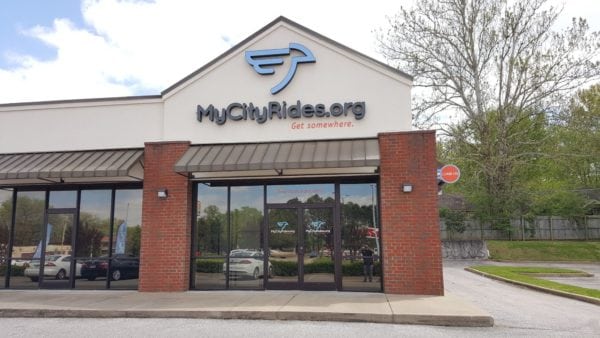Outside the Box – Part 2: Need a scooter? There’s an app for that!
BY SCOTT HOCHMUTH
A previous blog showcased the My City Rides Program in Memphis, which avails scooters to the adult working class community in need of economic and reliable transportation in light of an inefficient public transit system. To recap, this employer-sponsored program allows employees to purchase a scooter with training, gear, and service/maintenance for just $3 a day. Today’s blog examines two exciting new scooter rental services launched in Atlanta and Pittsburgh this month. Each company provides riders in need of transportation access to a collection of electric scooters through an on-demand mobile application.
Muving is a European company based in Spain that currently provides a fleet of 2,500 scooters in 12 cities across Europe. Atlanta is Muving’s flagship American location and services the Midtown area including the Georgia State University and Georgia Tech campuses with 75 scooters. Pittsburg-based Scoobi has established a similar service with 100 shared e-scooters covering much of the Downtown area.
Both services share a similar model: the user downloads an app, registers and gets approved as a rider, and then locates a nearby scooter. Once selected, the app will then activate the unit and release the trunk lock that stores a helmet for the rider. The rider travels to their destination, locks the helmet back in the trunk, and releases the unit for another rider to find on the app. Users can travel outside of defined areas of use, but may only park the scooter within the border of use in a public place when finished.
The goal of both of these companies is to provide transportation that is more convenient and less expensive than services from Uber or Lyft. Muving offers a free 30-minute ride to introduce the service to new riders and subsequently charges riders 35 cents a minute. Renters can put the unit on “hold” if running several errands for 15 cents per minute so that the scooter remains available between stops. Scoobi charges a flat fee of $5 for the first 20 minutes of use and 20 cents per minute thereafter.
Both services use electric scooters that top out at 30 MPH with a range of up to 45 miles before needing to be recharged. The scooter fleets are monitored by the company and serviced and recharged as needed. The location of each unit is monitored by GPS tracking and available scooters pop back up on the app after each use ready for the next rider. If a unit requires service or charging, the company is notified and that unit does not appear as available.
For cities and college campuses with growing traffic and parking problems, scooter rentals could certainly be a part of the solution. A study conducted in Brussels in 2011, found that just a 10 percent conversion to scooters and motorcycles would reduce traffic congestion by as much as 40 percent – and at a 25 percent conversion congestion was eliminated entirely. The estimated time savings amounted to 15,000 vehicle hours per day. Additionally, scooter conversion would have beneficial impacts on decreasing pollution and curtailing parking issues.
European cities have discovered the positive effect that scooters and motorcycles can have on traffic and congestion. U.S. cities can prevent or at least reduce congestion and parking constraints when implementing two wheeled transportation as a viable solution. One of the associated outcomes about the ride-share options now being introduced is the potential for the Powersports industry to catch up with Europe in extending the recreational scope of two-wheeled vehicles into daily transportation. That is, once rental riders are hooked on the economy and convenience of scooter use, the trend may be for folks to invest in a scooter or motorcycle of their own.
Scott Hochmuth is the owner of Real Performance Marketing, an Atlanta-based company representing seven different powersports related product lines in the Alabama, Florida, Georgia, Mississippi and Tennessee areas. He comes face-to-face with over 200 dealers every 8 weeks. He has been in sales since 1982 and started in the powersports industry in 1989 as a sales representative for a helmet manufacturer.

